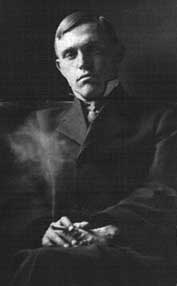Damon Runyon
|
|
Damon Runyon (October 4, 1884 - December 10, 1946) was a newspaperman and writer.
He was best known for his short stories celebrating the world of Broadway in New York City that grew out of the Prohibition era. He spun tales of gamblers, petty thieves, actors and gangsters; few of whom go by "square" names, preferring instead to be known as "Nathan Detroit", "Big Jule", "Harry the Horse", "Good Time Charlie", "Dave the Dude", and so on. These stories were written in a very distinctive vernacular style: a mixture of formal speech and colorful slang, always in present tense, and always devoid of contractions.
Here is an example from the story "Tobias the Terrible", collected in More than Somewhat (1937):
- If I have all the tears that are shed on Broadway by guys in love, I will have enough salt water to start an opposition ocean to the Atlantic and Pacific, with enough left over to run the Great Salt Lake out of business. But I wish to say I never shed any of these tears personally, because I am never in love, and furthermore, barring a bad break, I never expect to be in love, for the way I look at it love is strictly the old phedinkus, and I tell the little guy as much.
The musical Guys and Dolls and the play Little Miss Marker grew from his short stories.
Biography
He was born Alfred Damon Runyan in Manhattan, Kansas, and grew up in Pueblo, Colorado, where Runyon Field and Runyon Lake are named after him. He was a third-generation newspaperman, and started in the trade under his father in Pueblo. He worked for various newspapers in the Rocky Mountain area; at one of those, the spelling of his last name was changed from "Runyan" to "Runyon", a change he let stand. After a notable failure in trying to organize a Colorado minor baseball league, Runyon moved to New York City in 1910. For the next ten years he covered the New York Giants and professional boxing for the New York American. In his first New York byline, the American editor dropped the "Alfred", and the name "Damon Runyon" appeared for the first time.
A heavy drinker as a young man, he seems to have quit the bottle soon after arriving in New York. He remained a heavy smoker.
Runyon frequently contributed sports poems to the American on boxing and baseball themes, and also wrote numerous short stories and essays.
Gambling was a common theme of these works, and Runyon himself was a notorious gambler. A well-known saying of his paraphrases Ecclesiastes: "The race is not always to the swift, nor the battle to the strong, but that's the way to bet."
The Baseball Hall of Fame awarded Runyon the 1967 J.G. Taylor Spink Award for baseball journalism.
He is also a member of the International Boxing Hall Of Fame.
He was known for dubbing the boxer, James J. Braddock the Cinderella Man.
He died in New York City in 1946 and was interred in the Woodlawn Cemetery in The Bronx, New York.
External link
- Baseball Hall of Fame - Spink Award recipient (http://www.baseballhalloffame.org/hofers_and_honorees/spink_bios/runyon_damon.htm)

